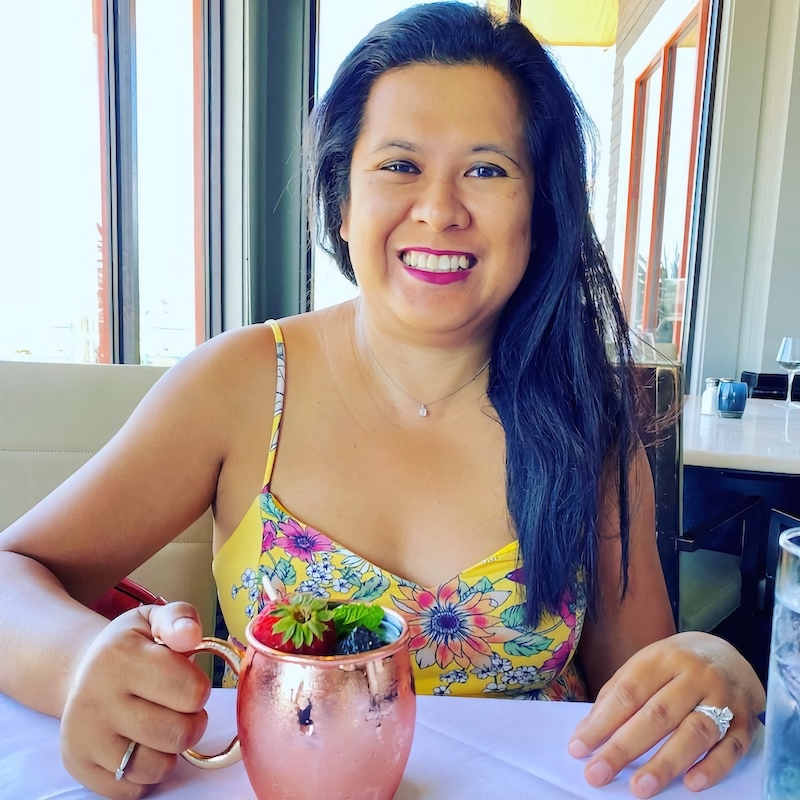Student Blog
Global Initiatives Team
WOSC 2022: Redefining Inclusion Towards Social Transformation ⟩
September 12, 2022, by Global Initiatives Team
By Abby Khou, MA ’23
The inaugural World Occupational Science Conference was a gathering of occupational scientists, occupational therapy students, practitioners and educators, and members of the interdisciplinary world who have dedicated their lives to the work of social transformation through the knowledge from the body of work of Occupational Scientists. Held at the Sheraton Wall Vancouver Centre in Vancouver, British Columbia, one of the featured speakers at WOSC 2022 was Dr. Sridhar Venkatapuram, Associate Professor in Global Health and Philosophy at King’s College London and Deputy of King’s Global Health Institute and Director of Global Health Education. Dr. Venkatapuram spoke about the importance of values in science and promoting a capabilities approach that emphasizes quality of life, among other themes that set the tone for conference. Dr. Lilian Magalhães was another featured speaker, and is an adjunct professor at Federal University of São Carlos, Brazil and Associate Professor at Western University in Canada where she is Professor Emeritus. She highlighted her lifelong work in Occupational Science, her familial roots, and the commitment of Occupational Science to social transformation. The inaugural event was hosted by the University of British Columbia Occupational Science and Occupational Therapy and the International Society for Occupational Science.
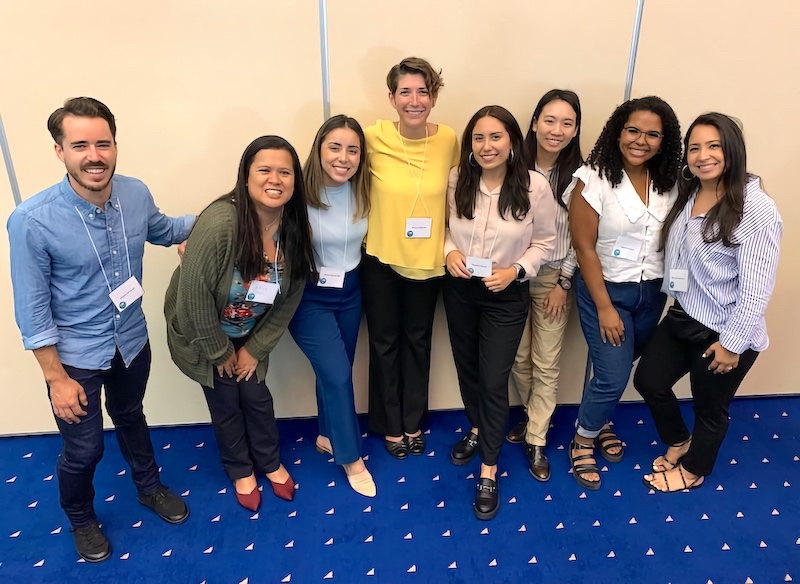
Adam Strizich, Abby Khou, Silvia Hernandez, Dr. Rebecca Aldrich, Daniela Flores, Yen Wen Pan, Kayla Brown, Monica Martinez
Our very own Dr. Rebecca Aldrich, Chair of the International Society of Occupational Science, along with Lisette Farias, Debbie Laliberte Rudman, Lilian Magalhães, Nick Pollard, and Roshan Galvaan, led a dialogic session entitled: Promoting an ‘unconference’ space for transformation of occupational science through critical dialogue. According to Farias et al. (2022), an “unconferencing” approach “prioritizes participation, reflection, and dismantling presenter-attendee hierarchies” (p. 4). By sitting in two concentric circles, the outer circle was able to actively listen as the inner circle addressed the question prompts and verbalized their thoughts. Participants spoke about Occupational Therapists and Occupational Scientists working hand in hand to achieve social change, the need for interdisciplinary involvement, and breaking away from traditional modes of communication such as research, to more grassroots initiatives such as those involving social media.
As a USC Chan second-year master’s student, a mother to a 6-year-old diagnosed with ASD and first-time conference attendee, I appreciated the themes of inclusion, play as occupation, belonging and the access of children to play and play spaces and the overarching theme of mobilization towards social transformation. There were a few presentations that particularly struck me, and further ignited my desire to advocate for a redefined sense of inclusion, the promotion of belongingness within the ASD community, and the awareness of play as occupation.
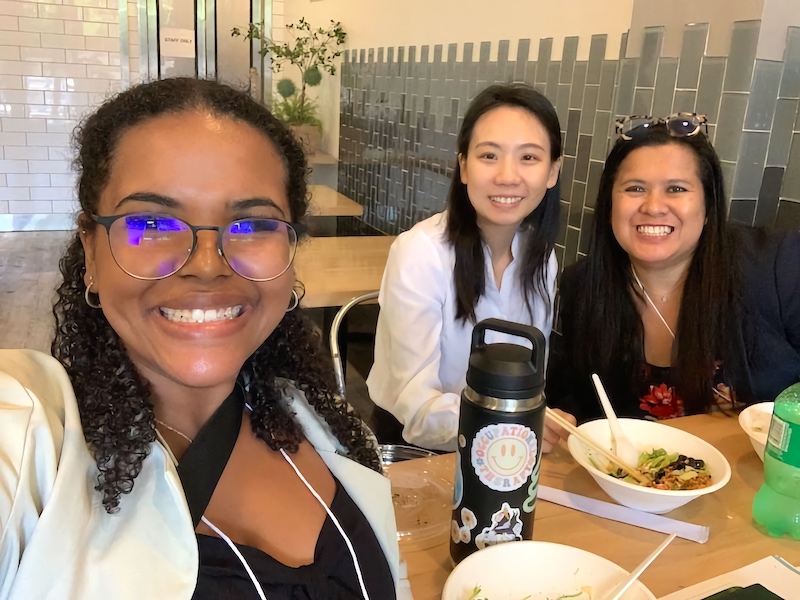
Kayla Brown, Yen Wen Pan, Abby Khou
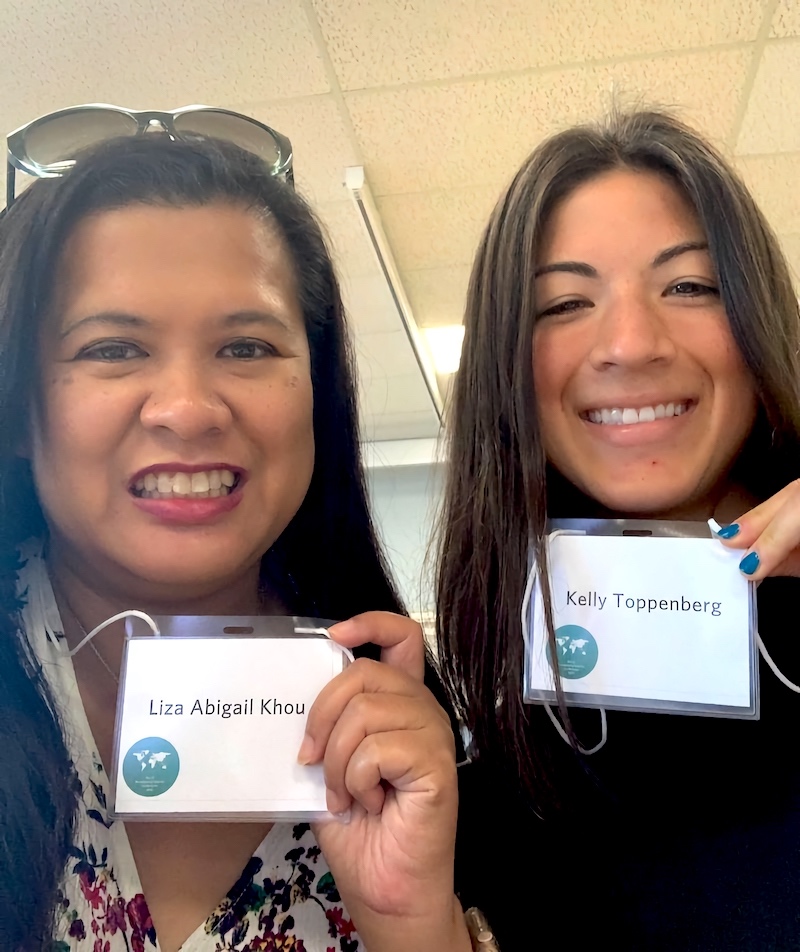
Abby Khou, Kelly Toppenberg
The passionate quality of the presentations on belongingness sometimes included tears, as presenters remembered their lived experiences of being a sibling to a disabled family member, or losing one’s cultural identity in the process of migration. I myself thought of my son Ethan while viewing “The Belonging Project: Conditions that support belonging for people with intellectual and developmental disabilities” presented by Paige Reeves, David McConnell and Shanon Phelan. I couldn’t help but share my own experiences as a member of the special needs parents community, sometimes being caught up in the pursuit of “services,” filling up my son’s schedule with therapy and appointments. “The Belonging Project” made me stop and think: does inclusion also result in exclusion if our idea of inclusion is for children to be included in manufactured spaces that we have created for them? Must we take away the agency of disabled children and plan out their days for them without consideration of where they truly want to be and who they desire to connect to? Is there a need to redefine the theory surrounding inclusion, mobilizing to translate into practice as we begin to chip away at the iceberg of social transformation? Reeves began her presentation quoting Reinders: “We create space and include people with [intellectual disability] as citizens . . . but do we also include them in our lives as human beings?”
The very definition of inclusion was questioned across different related presentations. The idea of having a “façade of inclusion,” that is, convincing ourselves as practitioners and caregivers of individuals with disabilities, that if we complete our checklists of the things we must do to advocate for our children’s inclusion, then our work is done. Comparing the façade of inclusion to the actual experience of being included was discussed in Paige Reeves, David McConnell and Shanon Phelan’s presentation: “The (radical) role of belonging in expanding and shifting understandings of social inclusion.” The Occupational Science perspective that the team was advocating for was a “paradigm shift” into a “meaningful involvement of disabled children’s voices.” What comes to mind is pediatric interventions that are child-led, respectful of families’ perspectives and culture, and the act of simply and truly listening in however way possible to the children when they communicate with us whether by verbal or by behavioral expression.
There is so much more to unpack from WOSC 2022 that I may not be able to express in this medium. I attempted to encapsulate such a wide and varied experience in the blog medium, but not quite able to represent all the meaningful experiences that I had at WOSC 2022. I had so many great and profound conversations and met so many wonderful people. As I moved from the conference back into my everyday life in my intersectional roles, I was filled with so many great ideas, a desire for social transformation and a further igniting of my passion for Occupational Science and Occupational Therapy. Maybe I left with more questions than answers, but that can be a good thing. Questions can lead to answers and answers can lead to solutions, and hopefully, continuing change.
References
Farias, L., Aldrich, R., Laliberte Rudman, D., Magalhães, L., Pollard, N., & Galvaan, R. (2022, August). Promoting an ‘unconference’ space for transformation of occupational science through critical dialogue [Dialogic session]. World Occupational Science Conference 2022, Vancouver, BC, Canada.
Reeves, P., McConnell, D., & Phelan, S. (2022a, August). The belonging project: Conditions that support belonging for people with intellectual and developmental disabilities [Paper presentation]. World Occupational Science Conference 2022, Vancouver, BC, Canada.
Reeves, P., McConnell, D., & Phelan, S. (2022b, August). The (radical) role of belonging in expanding and shifting understandings of social inclusion [Paper presentation]. World Occupational Science Conference 2022, Vancouver, BC, Canada.
⋯
Magic of GI ⟩
May 4, 2022, by Global Initiatives Team
Community International What are OS/OT?
By Maggie Goodfellow MA ’21, OTD ’22
Editors Alison Chang and Vanessa ElShamy
Entry-Level Professional Master’s students
If I told you there was magic behind one of the doors in CHP, would you believe me? Well, no — not the traditional type of ‘magic’ that involves playing cards or bunnies appearing out of hats, but rather, something even better. Behind the doors of CHP 161, you’ll find the magic of a global community, the magic of pushing boundaries, and the magic of discovering what it means to “grow together”. In case you couldn’t tell, the first word that comes to my mind when I think about Global Initiatives is . . . Magic (surprise!).
#1. The Magic of a Global Community. The door (and room) of CHP 161 can be quite deceiving at first glance. However, upon opening the door, you’ll immediately find a friendly face who will welcome you in and ask you about your day. As someone whose home is across the world in South Korea, the GI office quickly became my home away from home, somewhere I could go when I needed a break in between classes, somewhere I could trust would be welcoming and safe, and somewhere I knew a friend would be. The irony of our small office is that inside it lives a global community. Everyone’s culture is welcomed and the mundane interactions, such as sharing snacks from our respective countries or creating a poster for a holiday, become the building blocks of lifelong friendships. There’s something very special about the friendships built through GI, as they are grounded in our shared love for celebrating each other’s cultural differences and upbringings. Through Global Initiatives, I’ve seen the magic that can happen when you not only keep the door open for others, but also provide them with a seat, listen to what they have to say, and recognize there is always an opportunity to learn from them.
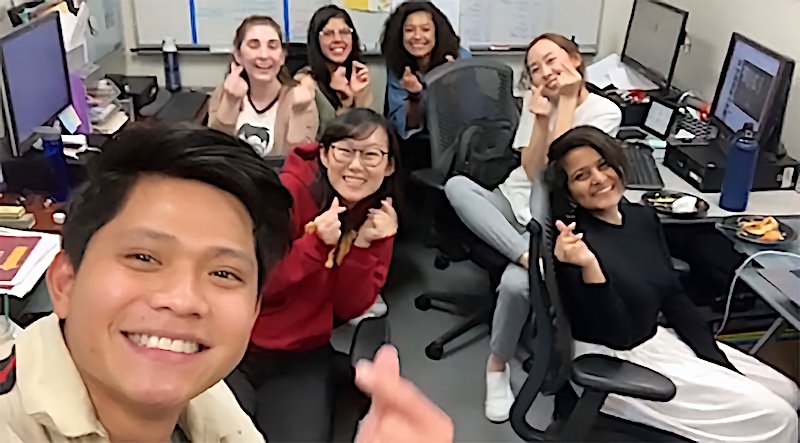
Moments in the office — our door is always open!
#2. The Magic of Pushing Boundaries. When it comes to magic tricks, you typically see the outcome but rarely see the hard work and determination that’s required to master them. More importantly, it takes confidence and the belief in yourself that you can do something that seems impossible. While it seems silly to compare the projects of GI to a magic trick, quite frankly, some of the projects did seem impossible at first. To name a few, just over the past 3 years our team has implemented Frientorship Circles, a global poster exchange, a global Pen Pal program, a “Global Citizenship” thread in the new Entry-Level OTD curriculum, and so much more. I’m incredibly grateful to this team who has time after time shared their creativity and demonstrated the power of creating something with their hearts and the intention to uplift others. Moreover, none of this would be possible without Danny Park, who empowers each member of our team to take their ideas and transform them into reality. Together, this is what creates the magic to push and continue pushing boundaries.
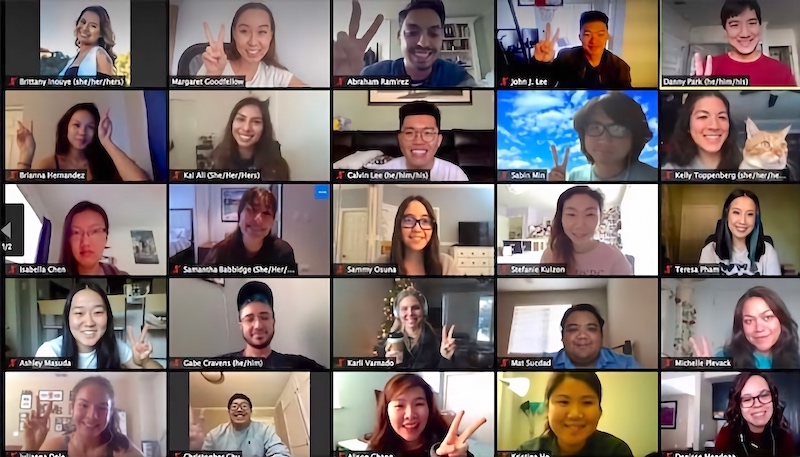
Friendtorship Circle meeting from 2020 — we had students from across all of Chan’s academic programs!
#3. The Magic of “Growing Together”. When I first joined Global Initiatives as a student worker, I was a first year MA-2 student who was eager to learn yet shy in voicing my opinions. It’s funny how, in just three years, I’m able to see so much growth in myself, both personally and professionally. Thank you, Global Initiatives, for being part of my journey and showing me that growth rarely happens alone — it happens through the mentorship and support of others. From celebrating birthdays to accomplishing various professional milestones together, I could not have asked for a better team to grow with by my side.
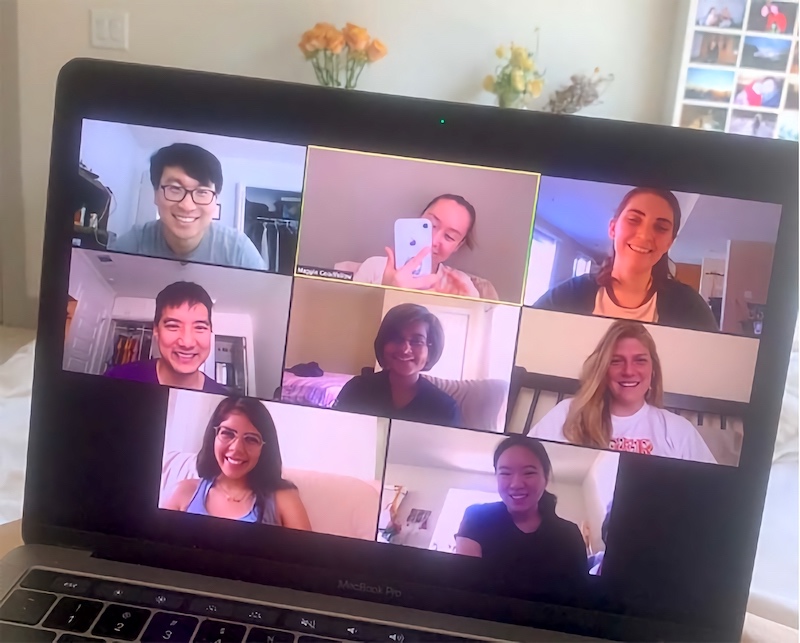
Fun fact — our team used to be 8 people total! We really have grown together individually and as an office
⋯
AHTO: An Introductory Retrospective ⟩
April 27, 2022, by Global Initiatives Team
By Carly Martinez MA ’23
Editors Abraham Ramirez and Michelle Plevack
Entry-Level Professional Master’s students
When I received my acceptance email to USC, I — like many others before me — wondered how I was going to do it. I knew that I would need a support system to keep me going. My family and I were not communicating, so I was scared. I felt alone.
Partway through the fall semester of my first year, I learned about a new organization through Global Initiatives aimed at the Spanish-speaking community — Asociación Hispanohablante de Terapia Ocupacional, or “AHTO.” I was thrilled, and looked forward to being around people who spoke Spanish, which was reminiscent of my late grandmother who helped raise me.
However, I was concerned that I might not be “Mexican enough” to participate, despite speaking Spanish. ‘Was that enough?’ ‘Was my Spanish good enough?’
I anxiously brought this up during an early interaction with AHTO. When I shared my concern, this sentiment was echoed by other members who also questioned their identities due to imposed cultural markers, which can feel a lot like gatekeeping. I learned that, like me, they too were in this in-between place, where we were left asking ourselves where we belong and if we were enough.
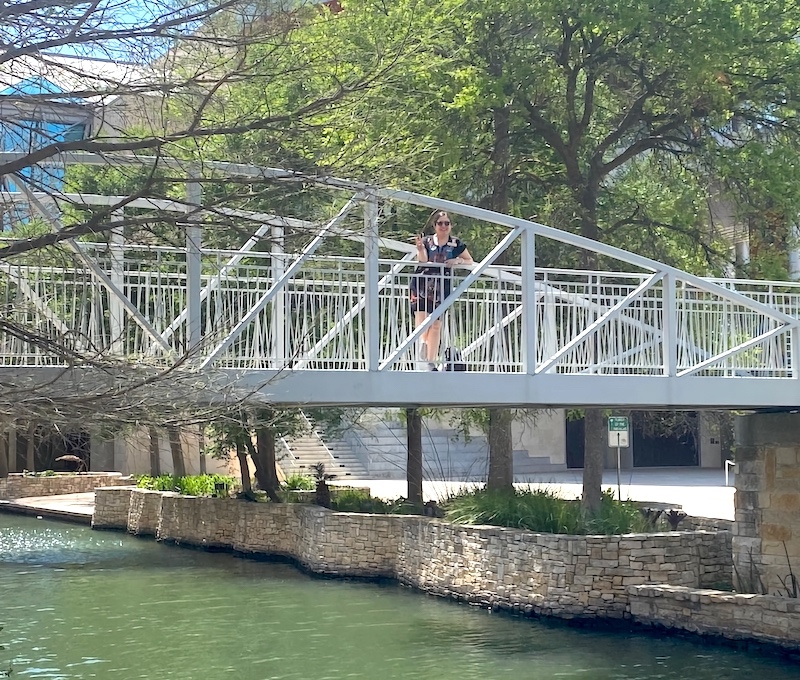
¡Saludos de AOTA San Antonio! (Greetings from the AOTA Conference in San Antonio!)
I recently told a friend that the reason why microaggressions are so insidious, is that they’re often so small that they can make you question whether you are overreacting to a situation or if it even took place the way you remember. This has been my experience as a member of a minoritized group — the feeling that I am living through a continuous microaggression, and left wondering if I am making things up or should be happy with the way things are. Or, are there legitimate reasons to be unhappy and should I ask for more? It’s a bit like being in a toxic relationship, and it can mess with your head, particularly when it weighs on you alongside class assignments.
As I began compiling stories of my fellow students’ experiences, the triumphs and challenges overheard at AHTO meetings at socials and at conferences, I began to see connections that had not been previously apparent to me. That’s not only amongst Latine* students at Chan, but other minoritized students as well. Conversations have taken place that require action and advocacy. They still are, and they probably always will, leaving a need to ask for more on an ongoing basis.
This is why I am glad organizations like AHTO exist. They serve as places where I and others can verbalize our experiences and share them with others, allowing the space to process them in a way that leads to validation and support. My hope for AHTO is that it will continue to provide a platform for students to demand change from the university and express their needs in a way that will continue to elicit change, not only for the Latine population, but everyone who feels like they need to make themselves seen, heard and understood.
I hope AHTO will serve as a model for, and collaborator with students seeking empowerment and resources. It is important for us to realize our power, particularly when we work together, because it is only when we feel acknowledgement and action on the part of the division that we will be able to create goals that are SMART (Specific, Measurable, Attainable, Relevant, and Time-based). Isn’t that OK to want?
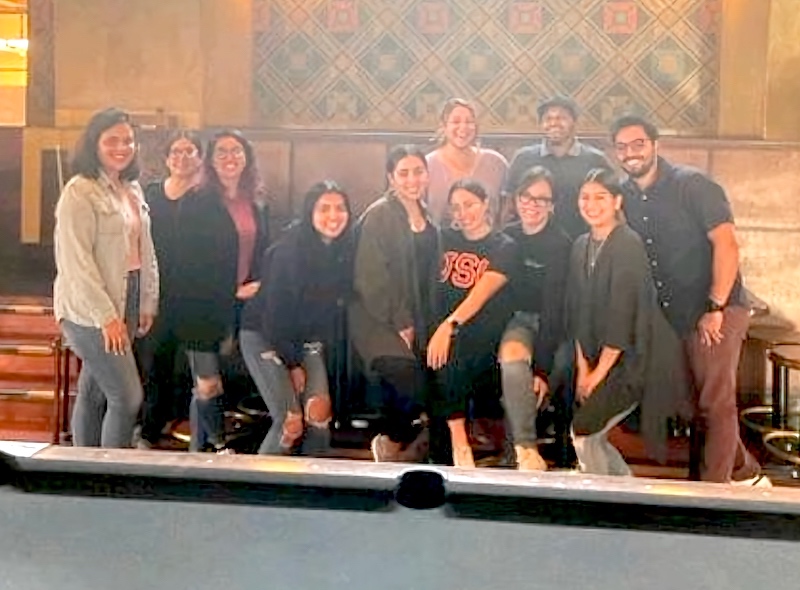
AHTO’s end-of-the-year social at Homebound Brewhouse on April 12, 2022
*I prefer to use Latine over Latinx or Latin@ because it works in both Spanish and English and is more inclusive. Latinx does not work in Spanish, so it is not the preferred term by some Spanish-speakers; instead it is looked down upon by many people living in the US and Latin America as a forced idea contrived by non-Latine, white folks. Please see this comic for more information and explanation.
⋯
Everything I know about life, I learned from OT ⟩
April 20, 2022, by Global Initiatives Team
Getting Involved International What are OS/OT?
By Josh Digao, Post-Professional Master’s Student
Editor Alison Chang and Vanessa ElShamy
Entry-Level Professional Master’s students
I am from a country that still has, at its very core, patriarchal values. Not to say that the Philippines is a backwards country, but I and a lot of the pre-social media generation Filipinos were raised to believe that men were supposed to act a certain way. When you are raised in such an environment, it becomes what you believe to be right and wrong. Growing up, I felt trapped in a box that dictated how I should think, act, and speak in order to be accepted as a tunay na lalaki (real man). “Don’t care too much”, “Don’t show your emotions”, “Never let others tell you you’re wrong.” In my mind, being this arrogant, unfeeling, uncaring person was what being a man meant. But I struggled with that belief; I did not want to align myself with that archaic idea of a “real man.” It was not until I took up OT that I learned I did not have to.
It was in OT school, the pontifical and royal University of Santo Tomas, that I met some of the strongest and most wonderful people who helped me unlearn my ideas of toxic masculinity and made me the person I am today. The first of which was a professor that tried her best to instill in her students the value of being kind. A Mabuting OT (kind OT) - that is what she wanted us to be. For her, it did not matter as much that you knew all the therapeutic techniques in the book, or that you could name every muscle, bone, or nerve in the human body. What mattered was that when faced with a client, you would treat them with the utmost respect and compassion, regardless of status, age, or ability. “It’s better to be the kindest therapist than the smartest therapist” is what she would always tell us. It was not until I encountered my first few clients that I realized just how right she was. Clients, and even their family members, responded best to therapy when they felt that their autonomy and personhood was respected and cared for.
The second lesson was that of empathy. This one I attribute to the remarkable group of humans I call my friends. I have been lucky enough to be around people who are deeply loving, sensitive, and emotionally mature. Through them, I learned that in order to truly understand the emotions of others, we need to be attuned to our own. However, before I could learn to comprehend my emotions, I had to allow myself to first feel them. This realization would come to not only help me in my personal growth, but in my professional growth as well. In clinics and hospitals, I would often encounter people at their lowest points. During those moments, I realized more than ever the importance of being empathetic to other people’s struggles.
The last lesson came from my clinical instructors during my internship. Being new to the field, I was largely unconfident in my skills and abilities. I had no experience, and on top of that, the knowledge I was heavily relying on was purely theoretical. But when my clinical instructors (all of whom were amazing OTs) gave me feedback, they would focus on what it was that I did well. They recognized my strengths first, and that gave me the foundation that I needed to develop my own professional identity. I learned not only to accept the person I was, flaws and all, but to also be confident in what I bring to the table.
I believe that OTs are some of the most incredible people out there. The kindness and wisdom that I have seen from every single OT I have met continues to amaze me. Though I consider myself to be a deeply flawed person, they have taught me that the person I am is enough. I have learned that the only way to be a “real man” is to be true to yourself. As I am currently in the process of unlearning outdated values from my childhood, I know that perfection is not my goal; kindness, understanding, and acceptance are. If we extend these values toward ourselves, we will realize that at the end of the day what really matters is we are all trying our best - and we can already be proud of that.
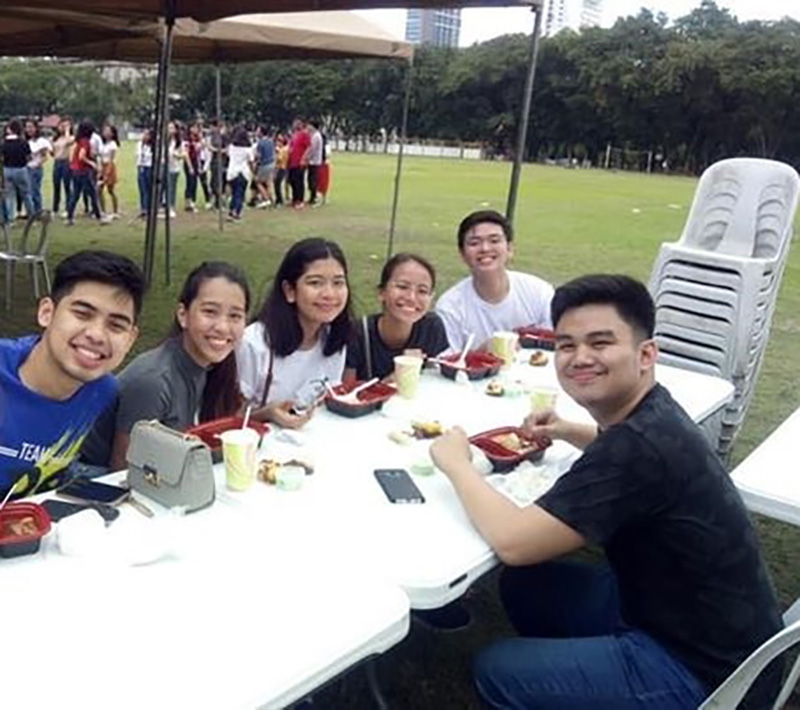
Josh and his friends back at UST
⋯
Ramadan Mubarak ⟩
April 13, 2022, by Global Initiatives Team
By Vanessa ElShamy, Entry-Level Professional Master’s student
Editors Michelle Plevack and Abraham Ramirez
Entry-Level Professional Master’s students
Ramadan — the ninth month of the Islamic calendar. In short, this is the month where Muslims believe that the Qur’an (our holy book) was revealed to the Prophet Muhammad. Most people know that Muslims fast during this month (no food or drink from sunrise to sunset, and yes, not even water), however, it goes much deeper than that. Muslims do not just fast from food and drink, we also fast from poor habits such as bad mouthing others and seek stronger spirituality and connection to God (Allah), pray heavily, read the Qur’an more often, and participate in profound self-reflection. Additionally, we are obligated to give to charity (zakat) and perform good deeds as often as possible — selfishness has no place in Ramadan. While individuals may approach Ramadan slightly differently around the world, it is understood that the main objective is not to make ourselves suffer, but to become more conscious of our beliefs and look inward to pursue true self-improvement. When you strip your life of worldly pleasures, you are only left with yourself. It may seem intense to some, but I truly feel that it cleanses my heart.
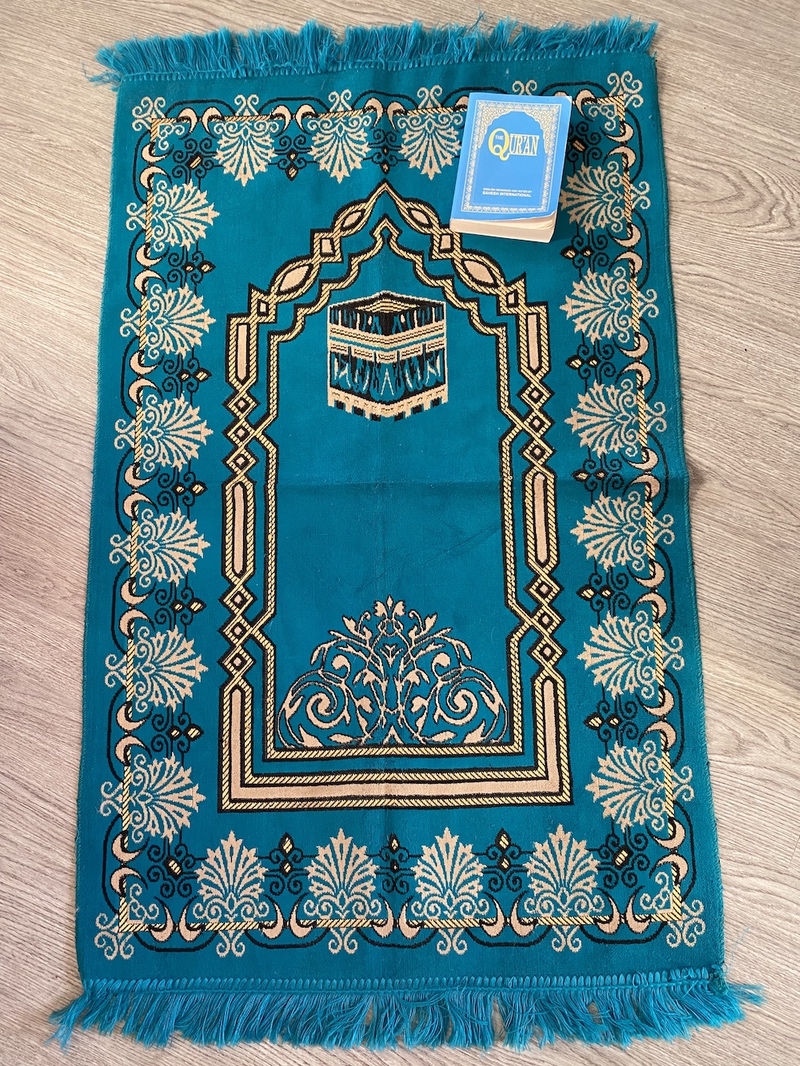
My prayer mat and Qur’an. We always face our mats and bodies toward the Kaaba, the sacred center of the holy city of Mecca.
Ramadan is based on the lunar calendar, so it starts on a different date every year. This year it began on April 2nd and will continue until May 2nd. This is the first year that I am observing Ramadan on my own, out of my parents’ house. It is also the first year in a long time that I am fasting during classes and exams, which I will admit, I am not exactly looking forward to. As beautiful and transformative as Ramadan is, it is not easy, and it is not supposed to be. We are 3 days into this year’s fast and so far I am surprised by how capable I have been without my morning coffee. I have not had any headaches from lack of caffeine thus far, and for this I say “Alhamdulillah” (“thank God” or “praise be to God”). While I have been a bit sad because I miss my family and our Ramadan traditions — feeding each other dates before Iftar (the meal that ends the day’s fast), drinking decaf coffee and eating baklava together after dinner, and more — I feel optimistic about what the month will bring me. As humans, we will make mistakes — they are a part of life. I know this to be true but I usually do not give myself the same grace I give others when I make mistakes. Ramadan reminds me time and time again that we are worth forgiving when we make mistakes, as long as we take responsibility for them and commit to doing better. Shame and guilt are powerful forces, but forgiveness is always stronger. Due to this, I have left Ramadan every year with a heightened sense of self-worth and a clearer picture of life’s purpose.
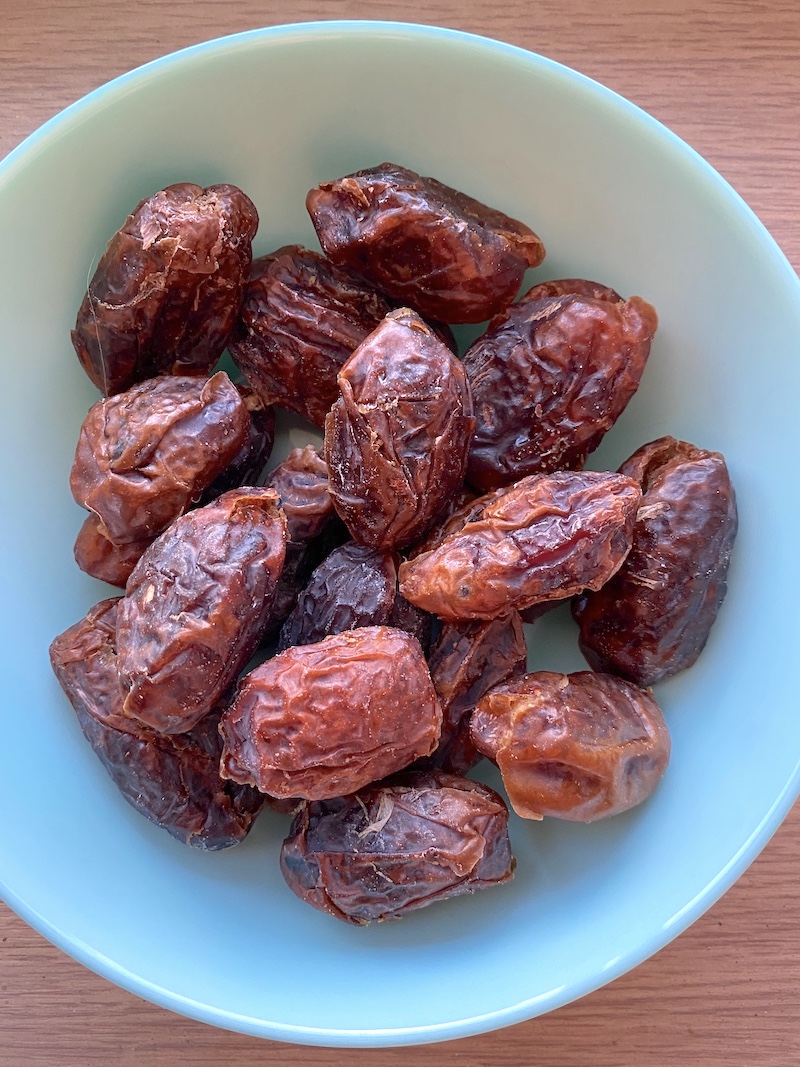
The Mejdool dates that I have been breaking my fasts with this year. Dates are high in sugar and vitamins, which makes them good to eat after a long day of fasting.
Participating in Ramadan is a meaningful occupation to me. During the month, fasting becomes an activity of daily living. When looking at the Occupational Therapy Practice Framework (OTPF), Ramadan encompasses client factors such as personal values, beliefs, and spirituality. While these factors may not be important to all, they are vital to people like me who shape their everyday lives off of certain spiritual sentiments. As the OTPF states, spirituality is “the aspect of humanity that refers to the way individuals seek and express meaning and purpose and the way they experience their connectedness to the moment, to self, to others, to nature, and to the significant or sacred” (AOTA, 2020). I honestly cannot imagine my life without Islam or Ramadan. Every time I waver from the spiritual path, I find myself being pulled back in. Every time I get annoyed that I “have” to fast and pray, I remind myself how beneficial it is for my spirit and mind. I think it is beautiful that so many people feel similarly about different religions and other forms of worship — this was a little glimpse into mine.
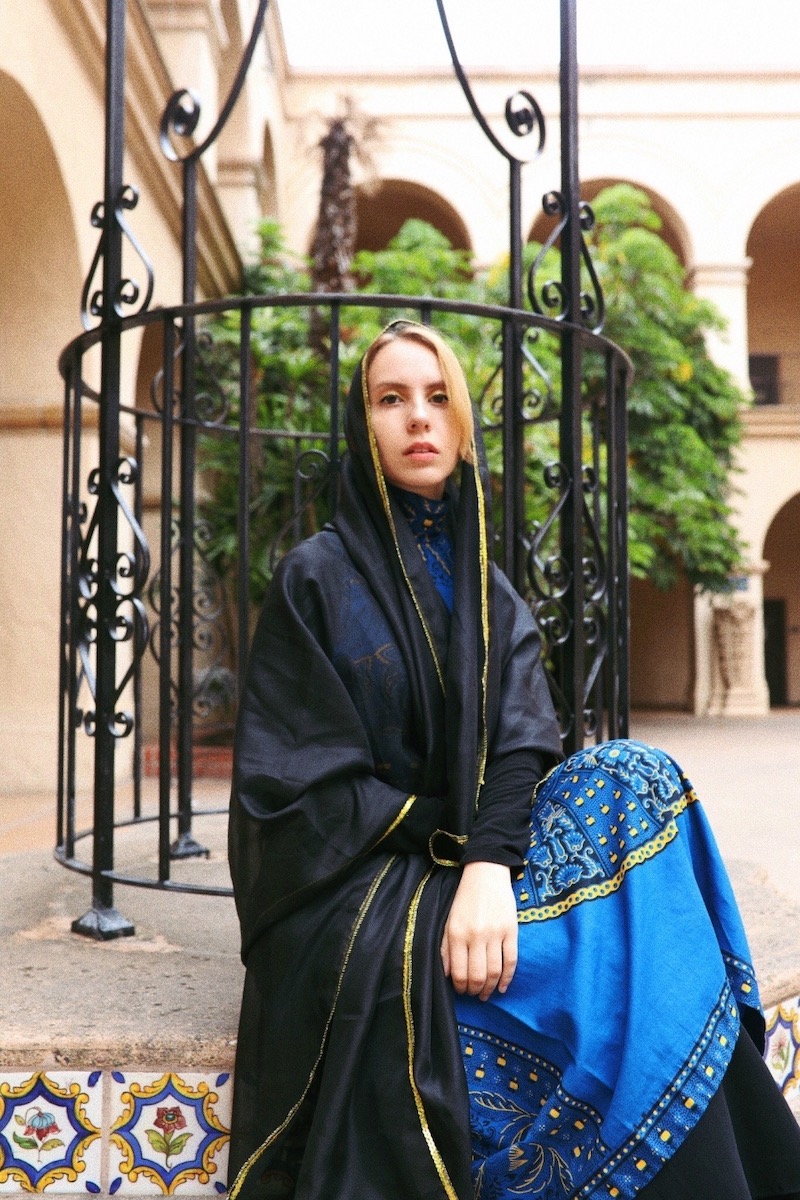
Me, a few years ago on Eid (the celebratory day after Ramadan ends).
⋯






